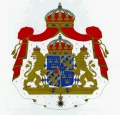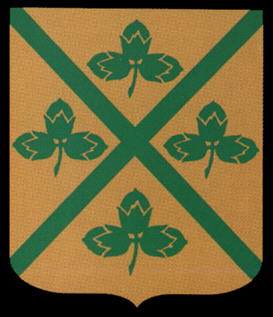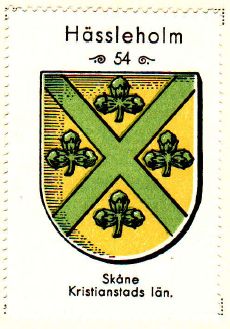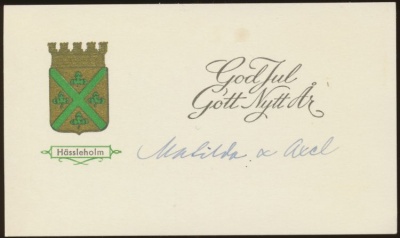Hässleholm: Difference between revisions
Knorrepoes (talk | contribs) m (Text replacement - "{{sweden}}" to "{{se}}") |
|||
| Line 14: | Line 14: | ||
===Origin/meaning=== | ===Origin/meaning=== | ||
The arms were officially granted on September 25, 1920 and confirmed in 1974. | The arms were officially granted on September 25, 1920 and confirmed in 1974. The Saltire symbolises Hässleholm as a Railway Hubb, the Railway fostered the growth of Hässleholm,<br> | ||
which recieved City Rights in 1914. The Nuts is a canting device. | |||
{|align="center" | {|align="center" | ||
Revision as of 19:15, 21 August 2019
Sweden heraldry portal
This page is part of the Sweden heraldry portal |
Heraldry of the World |
|
Civic heraldry:
|
Other heraldry: |
HÄSSLEHOLM
Province (Landskap): Skåne
County (Län): Skåne län (until 1997 Kristianstads län)
Additions : 1971 Stoby; 1974 Bjärnum, Hästveda (1952 Farstorp), Sösdala (1952 Brönnestad, Häglinge, Norra Mellby, Tjörnarp), Tyringe (1952 Finja, Hörja, Matteröd, Röke, Västra Torup), Vinslöv (1952 Gumlösa, Nävlinge, Sörby), Vittsjö (partly; 1952 Verum, Visseltofta)
Official blazon
En sköld av guld med ett grönt andreaskors, åtföljt av fyra nötklasar av samma färg.
Origin/meaning
The arms were officially granted on September 25, 1920 and confirmed in 1974. The Saltire symbolises Hässleholm as a Railway Hubb, the Railway fostered the growth of Hässleholm,
which recieved City Rights in 1914. The Nuts is a canting device.
| The arms in the Kaffe Hag album +/- 1935 |
Greeting card, 1950s |
Contact and Support
Partners:
Your logo here ?
Contact us
© since 1995, Heraldry of the World, Ralf Hartemink 
Index of the site
Literature : Nevéus and de Waern, 1992














